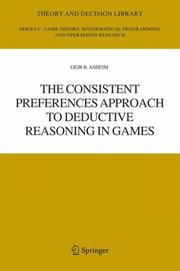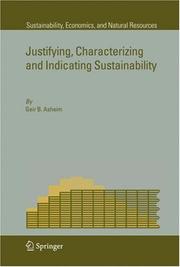| Listing 1 - 2 of 2 |
Sort by
|

ISBN: 0387262350 9780387262376 9780387262352 1441938761 9786612923838 1282923838 0387262377 Year: 2006 Volume: 37 Publisher: Dordrecht: Springer,
Abstract | Keywords | Export | Availability | Bookmark
 Loading...
Loading...Choose an application
- Reference Manager
- EndNote
- RefWorks (Direct export to RefWorks)
During the last decade I have explored the consequences of what I have chosen to call the 'consistent preferences' approach to deductive reasoning in games. To a great extent this work has been done in coop eration with my co-authors Martin Dufwenberg, Andres Perea, and Ylva Sovik, and it has lead to a series of journal articles. This book presents the results of this research program. Since the present format permits a more extensive motivation for and presentation of the analysis, it is my hope that the content will be of interest to a wider audience than the corresponding journal articles can reach. In addition to active researcher in the field, it is intended for graduate students and others that wish to study epistemic conditions for equilibrium and rationalizability concepts in game theory. Structure of the book This book consists of twelve chapters. The main interactions between the chapters are illustrated in Table 0.1. As Table 0.1 indicates, the chapters can be organized into four dif ferent parts. Chapters 1 and 2 motivate the subsequent analysis by introducing the 'consistent preferences' approach, and by presenting ex amples and concepts that are revisited throughout the book. Chapters 3 and 4 present the decision-theoretic framework and the belief operators that are used in later chapters. Chapters 5, 6, 10, and 11 analyze games in the strategic form, while the remaining chapters-Chapters 7, 8, 9, and 12-are concerned with games in the extensive form.
Economics/Management Science. --- Economic Theory. --- Game Theory, Economics, Social and Behav. Sciences. --- Operations Research/Decision Theory. --- Economics. --- Mathematics. --- Economie politique --- Mathématiques --- Economics --- Mathematics --- Game theory --- Decision Making --- Mathematical models --- Decision making -- Mathematical models. --- Game theory. --- Statistics. --- Decision making --- Business & Economics --- Economic Theory --- Algebra --- Physical Sciences & Mathematics --- Math --- Games, Theory of --- Theory of games --- Operations research. --- Decision making. --- Mathematical models. --- Economic theory. --- Economic Theory/Quantitative Economics/Mathematical Methods. --- Mathematical Modeling and Industrial Mathematics. --- Operation Research/Decision Theory. --- Science --- Economic theory --- Political economy --- Social sciences --- Economic man --- Models, Mathematical --- Simulation methods --- Deciding --- Decision (Psychology) --- Decision analysis --- Decision processes --- Making decisions --- Management --- Management decisions --- Choice (Psychology) --- Problem solving --- Operational analysis --- Operational research --- Industrial engineering --- Management science --- Research --- System theory --- Decision Making - Mathematical models

ISBN: 9781402062001 1402061994 9781402061998 9048175631 9786613934185 1402062001 1283621738 Year: 2007 Publisher: Dordrecht: Springer,
Abstract | Keywords | Export | Availability | Bookmark
 Loading...
Loading...Choose an application
- Reference Manager
- EndNote
- RefWorks (Direct export to RefWorks)
In 1987 the report of the World Commission on Environment and Development (WCED) introduced the concept of sustainable development into the political agenda. The notion of sustainability and the need to understand its full implications have sparked much interest and considerable research in various disciplines, including economics. This volume brings together 18 articles published during the last 20 years, devoted to understanding the concept of sustainable development. These articles provide economic analysis of this notion from three different perspectives: Justifying Sustainability (why care about whether development is sustainable) Characterizing Sustainability (what does sustainable development look like) Indicating Sustainability (how to tell whether development is sustainable) The first part (Justifying Sustainability) analyzes from a normative point of view why it is desirable for our generation to contribute to the implementation of sustainable development. The second part (Characterizing Sustainability) describes how manmade capital (both real and human) must be accumulated in order to make up for decreased availability of natural capital. The third part (Indicating Sustainability) examines rules and methods for attaining sustainable development for current and future generations. Each part begins with an article which functions as a survey. An up to date introduction serves to tie the three parts of the volume together.
Environment. --- Sustainable Development. --- Environmental Economics. --- Economic Growth. --- Environment, general. --- Environmental sciences. --- Sustainable development. --- Endogenous growth (Economics). --- Environmental economics. --- Sciences de l'environnement --- Développement durable --- Croissance endogène (Economie politique) --- Economie de l'environnement --- Economic development -- Environmental aspects. --- Sustainable development -- Mathematical models. --- Earth & Environmental Sciences --- Environmental Sciences --- Sustainability. --- Sustainability science --- Economic growth. --- Human ecology --- Social ecology --- Environmental science --- Science --- Development, Economic --- Economic growth --- Growth, Economic --- Economic policy --- Economics --- Statics and dynamics (Social sciences) --- Development economics --- Resource curse --- Environmental quality --- Development, Sustainable --- Ecologically sustainable development --- Economic development, Sustainable --- Economic sustainability --- ESD (Ecologically sustainable development) --- Smart growth --- Sustainable development --- Sustainable economic development --- Economic development --- Environmental aspects --- Economic aspects --- Balance of nature --- Biology --- Bionomics --- Ecological processes --- Ecological science --- Ecological sciences --- Environment --- Environmental biology --- Oecology --- Environmental sciences --- Population biology --- Ecology
| Listing 1 - 2 of 2 |
Sort by
|

 Search
Search Feedback
Feedback About UniCat
About UniCat  Help
Help News
News